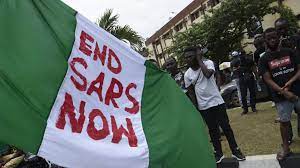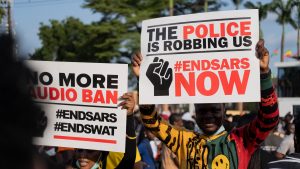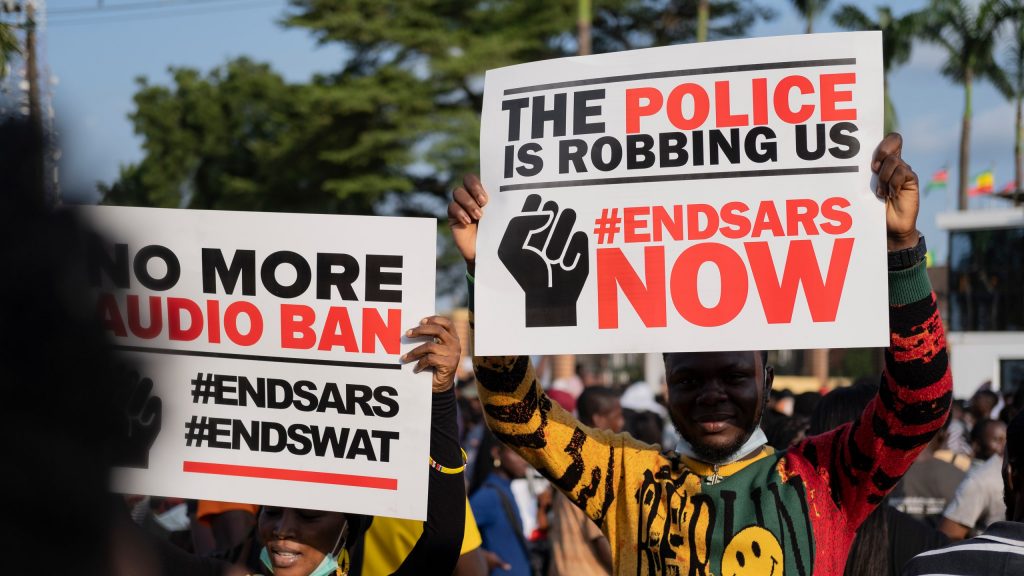 By Richard Imhoagene
By Richard Imhoagene
(Originally written on October 20, 2021)
As we reflect on that dark day in October 2020, the most important question remains, “who ordered the Lekki Tollgate shooting”? Pictures and videos quickly went viral in the evening of October 20 and the early hours of October 21 2020 across social media platforms and several mainstream media showing blood stains on the floor and people displaying alleged gunshot wounds at the Lekki Toll Gate in Lagos. Others allegedly picked up live bullets at the scene, fired by soldiers of the Nigeria Army. It was quickly tagged “Lekki Massacre”.
Young Nigerians took to the streets on 20th of October 2021 to commemorate those who reportedly lost their lives more than a year ago and reecho their struggle for a better police force and a Nigeria that works for everyone.
Amnesty International released a statement saying at least 12 people were killed on that day, an allegation strongly denied by the Nigerian government, especially considering the fact that the only corpse discovered in or around the area till date was the one found floating on the nearby lagoon days later, and another which the Lagos State Governor, Babajide Sanwo-Olu said was traced to a morgue in the state. There is yet to be any connection established between those corpses and the unfortunate event that took place on that sad October day in 2020.
Sparked by viral video showing killing of a young man by SARS officials in Delta State
Protests had swept through the nation like wildfire, traversing regions, states and ethnic borders and soon became a common coinage on the lips of everyone- young and old. That single hashtag that began on Twitter in the early days of October 2020 soon metamorphosed into a nationwide and global movement. A hashtag that surfaced after a video went viral, showing the alleged killing of a man by SARS officials in Delta State.
For many, the #EndSARS protests were not a mere demonstration against police brutality, but the result of built-up frustrations over the systemic failure of successive governments to set things right. Whilst the final spark arose from failure to implement long-overdue police reforms, the real problems, according to experts, stemmed from lack of judicious investments in the country’s educational sector, a failing health sector, unemployment, poverty, corruption and decades-long disconnect between the government and the people.
The Judicial Panel of Inquiry set up by the Lagos State Government was, after the October 20 incident, further mandated to investigate the cases of alleged victims of the #EndSARS protests. A report compiled and leaked to the public weeks ago indicted the Nigerian Army, the Nigerian Police Force, the Toll Gate Managers- LCC, and by extension the Lagos State Government and the Federal Government.
However, the White Paper released and adopted by a committee set up by the same government rejected most of the panel’s findings and recommendations, especially those ones that touch on the number of persons killed and circumstances surrounding their death. To save face, Governor Sanwo-Olu further called for a Peace Walk, but was somewhat ignored and mocked by those he actually sought to get support from. Many supporters of the #EndSARS movement see the White Paper as rendering futile the entire work of the panel for almost a year.
The protest itself may be over, but the yearnings remain fresh on the minds of Nigerians. There are several lessons before us as a nation. At face value, the protesters may have learnt the art of concession and leadership as an integral part of conflict. The government, on the other hand, should understand it is no longer business as usual and the defiance showed during the period is proof that the people are beginning to shake off the mental shackles imposed by 30 years of oppressive military rule.
But there’s more to learn. Democracy, according to Abraham Lincoln, is a government of the people, by the people and for the people. This presupposes a loose concept of representation made up of a minority, chosen by the majority to do their bidding. Unfortunately, that has not been the case in Nigeria. Blinded by the love for power and the desire to hold on to it, public offices have been plundered for partisan gains and personal aggrandisement by successive governments.
Corruption and abuse of office, coupled with the disconnect between young Nigerians below 30- who make up more than 60% of the nation’s population- and the political class who simply revel in the delusion that everything is under control, has led to an atmosphere of mistrust and a lack of confidence in government. No country can move forward without the participation and support of its people. On the other hand, no citizen will support a government it doesn’t trust. No matter how well-intentioned a government is, it needs the cooperation of the people to implement policies and actions.
At the heart of this is participation through engagement, openness and information management. The mentality that governance is a battle between the people and government must end. Government must also begin to act like the people actually matter in the way it goes about its plans. A point in focus are the events that took place after the protests. Nigerians invaded government storage facilities in several states including Lagos, Kaduna, Taraba, Ogun and Ekiti to loot Palliatives originally meant to ease the pains of the COVID-19 pandemic.
Even when some states cautioned that some items looted were poisonous and not fit for consumption, the people defied such warnings. On the other hand, the explanations issued by CA-COVID, the Presidential Task Force on COVID-19 and even the Federal Government were dismissed by Nigerians as falsehood. That episode was a clear expression of mistrust, stemming from a history of misuse and abuse of public trust. Although it didn’t start today, reparation can begin immediately. Imagine that government had actually announced earlier that items had been donated by CA-COVID on certain dates and will be distributed on certain dates, no one would’ve thought the items were being hoarded. Such is the power of information management.
On the issue of active participation, the “Not to Young to Run” bill was signed into law by President Muhammadu Buhari in May 2018. While it was well received by the youth, there are still concerns about cost of elections and actual opportunities within political parties. An honest position was recently issued by Governor of Kaduna State, Nasir El Rufai when he appeared as a panelist in the Radio Now Urgent Conversations in February 2021. He urged young Nigerians to populate political parties and take over using their numbers as no one will simply give them tickets in a party with ranks and structure.
The brilliant young professionals must begin to join or form political parties and run for offices to implement the change they want to see. Those who will not must ensure they come out during elections and vote for the right candidates. The call for good governance and transparent representation is ever more present today than it has ever been in the history of Nigeria. It requires collective efforts, and just like the Arab Spring and the French Revolution, many Nigerians hoped the #EndSARS protests would be the start of something great. More importantly, everyone must sit at the table and have honest conversations around nation building.
